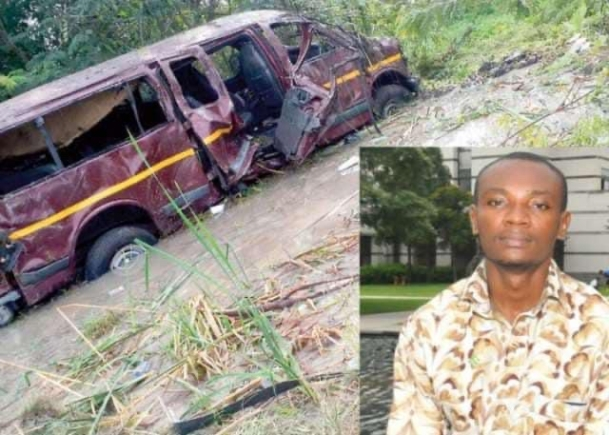Ten years ago today, August 20, a tragic accident involving presidential reporters claimed the life of journalist Samuel Nuamah and left several others injured.
The accident sent shockwaves through the nation, particularly within media circles.
As the survivors and the media fraternity commemorate a decade since this heartbreaking event, colleagues, friends, and family honour the lives lost and reflect on the lasting impact on press safety.
On August 20, 2015, members of the presidential press corps accompanied President John Dramani Mahama to Ho for an official engagement.
We travelled in two vehicles. After the assignments, we decided to take the lead back to Accra, as the President was having some private engagements in Ho.
Disaster struck on our return journey when one of the vehicles, a Ford mini bus, suffered a rear tyre burst while speeding along the road.
The driver struggled to maintain control but ultimately lost his grip, causing the vehicle to careen off the road.
It was horrifying. I heard a loud bang, and then the vehicle flipped like a toy, somersaulting multiple times before crashing into a nearby bush.
Samuel Nuamah, a 36-year-old journalist from the Ghanaian Times, was violently ejected from the mangled wreck, and the vehicle then landed on him in a muddy ditch, killing him instantly.
Although my seatbelt kept me in my seat during the rollover, the violent motion caused me to hit my head, resulting in a cut and neck pain.
The injured journalists were first taken to the Michel Camp health facility, then airlifted in a military helicopter to the Air Force Base, and subsequently transported by ambulance to the 37 Military Hospital.
In fact, as you read this piece, one of the injured victims, William Gentu of Peace FM, is still battling life-threatening injuries.
When I spoke with him this morning, he told me he underwent yet another surgery two weeks ago on his hand and is scheduled for a review and dressing today. His fight is a stark reminder that for the victims, the crisis is far from over.
This tragedy left an indelible mark, serving as a grim reminder of the risks journalists face while on duty and highlighting the urgent need for reforms to ensure their safety.
It raised pressing questions about the safety protocols for journalists on presidential assignments. Many demanded better vehicles, stricter speed regulations, and improved emergency response measures for journalists.
Additionally, there was a call for media organisations to intensify training for reporters assigned to high-risk situations.
For us, his former colleagues, the pain of that day still remains fresh. Nuamah was more than just a journalist—he was a storyteller who gave voice to the people.
He was a dedicated reporter known for his outstanding coverage of presidential activities. No policy change can bring Nuamah back, but we hope his death will make the job safer for others.
This afternoon, his colleagues will lay a wreath at his tomb at the Osu Cemetery in Accra.
As the media landscape continues to evolve, those who knew him can only keep his memory alive through relentless, principled reporting.
A decade may have passed, but the lessons from that day remain urgent. Journalists risk their lives to inform the public—their safety must never be an afterthought.
Source: Graphic.com.gh
ALSO READ:



